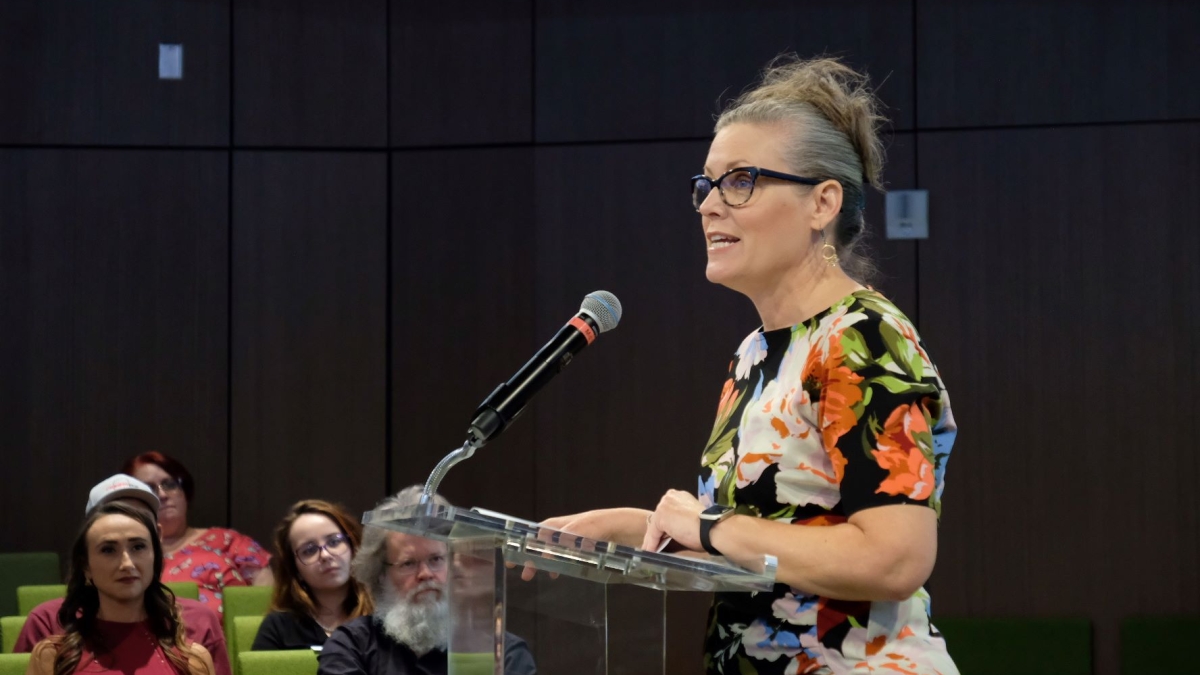Gov. Katie Hobbs joins ASU for Earth Day celebration

Arizona Gov. Katie Hobbs speaks at the Rob and Melani Walton Center for Planetary Health at Arizona State University for Earth Day 2023. Photo by Katelyn Reinhart
In celebration of Earth Day, students, faculty and staff from across the Julie Ann Wrigley Global Futures Laboratory and beyond were joined by Arizona Gov. Katie Hobbs for a showcase of Arizona State University's expertise, technology and insights related to humanity’s relationship with our planet. Throughout each portion of the event, the overarching theme was clear: We are actively shaping our future for an Arizona — and world — where all may thrive.
Along with a special opening address from Hobbs, the celebration included a panel of students sharing their experiences in sustainability spaces, a discussion on the future of water in Arizona and an interactive demonstration on how to deploy solar power showcasing ASU’s strategic decision-making tool, Decision Theater.
“That first Earth Day marked a growing acknowledgment by the government that we as humanity are not separate from nature, but rather part of it,” Hobbs said. “Our collective success and prosperity depends on a flourishing, thriving natural world.”
Hobbs pointed towards drought, wildfires, rising temperatures and poor air quality as some of the most pressing crises in our state. As climate change compounds these concerns, Hobbs said building a sustainable future is possible through collaborative efforts.
“We have so much work to do, and we can only do it together,” Hobbs said. “My administration is already meeting with and working closely with our state universities, who have been true leaders on climate change research and solutions.”
Collaboration between ASU officials and the Governor’s Office has already begun, including the Arizona Water Innovation Initiative, an ASU-led statewide effort aimed at developing research-based and implementable solutions to address the water crisis. The initiative's strategy team is working closely with the current administration, including the new Office of Resiliency led by ASU alumna Maren Mahoney.
Jay Famiglietti and Amber Wutich, both members of the Arizona Water Innovation Initiative strategy team, participated in a panel discussion on the future of water in Arizona. Famiglietti is a professor with the School of Sustainability, and Wutich is a President’s Professor at the School of Human Evolution and Social Change and director of the Center for Global Health at ASU.
A demonstration on solar power deployment was led by Chelsea Dickson, assistant director of Decision Theater, and Manfred Laubichler, director of both the School of Complex Adaptive Systems and Decision Theater. Through the interactive tool, audience members voted on which sites would be the most appropriate to locate a hypothetical solar power plant.
In addition to faculty and staff presentations, students also led conversations at the Earth Day celebration. ASU students Kyleigh Brown, Kennedy Gourdine, Mauricio Juarez Leon and Jordan King contributed their thoughts on Earth Day and their roles as student changemakers. Fellow ASU student Elizabeth Quigley moderated the discussion.
In her speech, Hobbs encouraged students to consider employment opportunities offered at state agencies, where she said “together, we can grow a more resilient Arizona.”
“I look forward to seeing what I know Arizona can do in the face of our shared crises when we work together,” Hobbs said.
More Science and technology

Breakthrough copper alloy achieves unprecedented high-temperature performance
A team of researchers from Arizona State University, the U.S. Army Research Laboratory, Lehigh University and Louisiana State…

4 ASU researchers named senior members of the National Academy of Inventors
The National Academy of Inventors recently named four Arizona State University researchers as senior members to the prestigious…

Transforming Arizona’s highways for a smoother drive
Imagine you’re driving down a smooth stretch of road. Your tires have firm traction. There are no potholes you need to swerve to…

